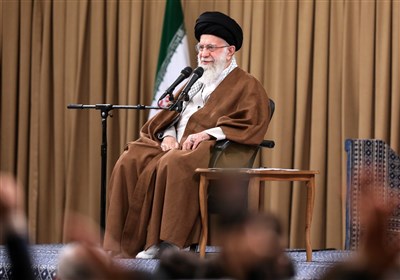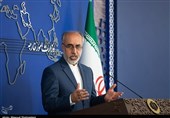Expert: Takfiris Just One Step Away from Salafists, Wahhabis
TEHRAN (Tasnim) – An American political pundit believes that Takfiri ideology is just one step away from contemporary Salafism and Wahhabism, which he said reveals a "proclivity" among certain Persian Gulf states to provide financial support for the extremist groups.
In an interview with the Tasnim News Agency, James L. Gelvin of the University of California, Los Angeles (UCLA), has made comments about the origins of the Islamic State in Iraq and the Levant (ISIL) militants, the latest developments in Iraq and the growing trend in extremism across the Middle East and North Africa.
Professor Gelvin, 63, is an American scholar of Middle Eastern history. He has been a faculty member in the department of history at the UCLA since 1995 and has written extensively on the history of the modern Middle East, with particular emphasis on nationalism and the social and cultural history of the modern Middle East.
The following is the full text of his interview with Tasnim:
Q: Where does the Islamic State in Iraq and the Levant (ISIL, alternatively known as the ISIS) historically originate from? And who, in the past and present, supported those armed insurgents?
ISIS is the latest incarnation of the jihadi/Takfiri movement in Iraq. The first incarnation of that movement, Tawhid wal-Jihad, was founded in 2003-4 by Abu Musab al-Zarqawi. Zarqawi was not an Iraqi: as his name denotes, he came from Zarqa in Jordan. He was responsible for establishing a group affiliated with al-Qaeda in response to the American invasion of Iraq. Over time, this particular group began to evolve as it took on alliances with other jihadi/Takfiri groups, with non-jihadi/Takfiri groups, and as it separated from groups with which it had been aligned. Tawhid wal-Jihad thus evolved into al-Qaeda in Iraq, which had strained relations with "al-Qaeda central." These strains were caused by the same factors that have created strains between ISIS and al-Qaeda central. Zarqawi had adopted the tactic of sparking a sectarian war in Iraq by blowing up the Golden Mosque in Samarra, thus instigating Shiite retaliations against Iraq's Sunni community, which, in turn, would get mobilized, radicalized, and strike back, thus joining al-Qaeda's jihad. Ayman al-Zawahiri in al-Qaeda central sent Zarqawi a stinging, public rebuke. According to Zawahiri, those al-Qaeda should be fighting (the militants) belonging to the Crusader-Zionist alliance, not other sects of Islam (however distasteful those sects might be).
Q: Do they stick to “theological principles” in their behavior or are they more flexible than what they are supposed to be?
What this demonstrates is a long-term problem al-Qaeda central (command) has had with its affiliates. Al-Qaeda is extraordinarily weak on organization and extraordinarily strong on ideology, which is the glue that holds the organization together (which is why I believe al-Qaeda is currently falling apart, as I'll explain below). The name al-Qaeda means "the base" in Arabic. Bin Laden once asked a journalist why Westerners were making so much of a name, a structure, an organization. As he put it, “we were just a group of jihadists in Afghanistan without any real organization. Every once in a while someone would say, Let's go back to the base (al-qaeda)." Westerners latched on to that name and it stuck. But that does not mean that al-Qaeda ever had a firm organizational structure.
Q: Media outlets seems to have pictured and illuminated them as a single entity, is it correct on the ground or do they have different branches, divisions and so on?
Since those early days, there have been a number of individuals, such as Abu Musab al-Suri, who have worked out a specific al-Qaeda ideology and strategy. The ideology of al-Qaeda can be broken down into two parts:
First, the Islamic world is at war with a transnational Crusader-Zionist alliance and it is that alliance --the "far enemy"-- and not the individual despots who rule the Muslim world --the "near enemy"-- which is Islam's true enemy and which should be the target of al-Qaeda's jihad.
Second, al-Qaeda believes that the state system that has been imposed on the Muslim world was part of a conspiracy hatched by the Crusader-Zionist alliance to keep the Muslim world weak and divided. Therefore, state boundaries are to be ignored.
These two points, then, are the foundation for the al-Qaeda philosophy. It is the philosophy in which Zarqawi believed and it is also the philosophy in which the current head of ISIS, Abu Bakr al-Baghdadi, believes as well.
We don't know much about Baghdadi. We know his name is a lie --he was not born in Baghdad, as his name denotes, but rather in Samarra. We know he was born in 1971 and has some sort of degree from Baghdad University. We also know he was imprisoned by the Americans in Camp Bucca in Iraq. It may have been there that he was radicalized, or perhaps upon making the acquaintance of al-Zarqawi.
Over time, al-Qaeda in Iraq evolved into the Islamic State of Iraq, which, in turn, evolved into the Islamic State of Iraq and Syria. This took place in 2012 when Baghdadi claimed that an already existing al-Qaeda affiliate in Syria, Jabhat al-Nusra, was, in fact, part of his organization.
This was unacceptable to the head of Jabhat al-Nusra, Abu Muhammad al-Jolani (Jolani's name indicates that he came from the Golan region of Syria --now under Israeli control-- and points to a difference between ISIS and Jabhat al-Nusra: the former consists mainly of foreign fighters in Syria; the latter of native Syrians). Jolani took the dispute to Ayman al-Zawahiri who ruled in favor of Jolani. Zawahiri declared Jabhat al-Nusra to be the true al-Qaeda affiliate in Syria, ordered Baghdadi to return to Iraq, and when Baghdadi refused, Zawahiri severed ties with him and his organization.
There is a certain irony in this, inasmuch as Jabhat al-Nusra does not adhere to the al-Qaeda ideology, which is the only thing that holds the organization together. On the other hand, ISIS does. Whereas Baghdadi believes there should be no national boundaries dividing Syria and Iraq, Jolani restricts his groups’ activities to Syria. Whereas the goals of Baghdadi (and al-Qaeda) are much broader than bringing down an individual despot, Jabhat al-Nusra's goal is the removal of (Syrian President) Bashar al-Assad. And whereas Baghdadi (and al-Qaeda) believe in a strict, Salafist interpretation of Islamic law, Jabhat al-Nusra has taken a much more temperate position in the territories it controls. The enforcement of a strict interpretation of Islamic law --from the veiling of women to the prohibition of alcohol and cigarettes to the use of hudud punishments-- has made ISIS extremely unpopular wherever it has established itself in Syria. It is currently attempting to do the same in Mosul. When Jabhat al-Nusra controlled the city of Raqqa in Syria, women who were unveiled were unmolested.
Q: According to ISIL’s code of conduct, is there a possibility that it establishes an administrative system capable of governing a society as seem to be much more radical than the Taliban?
The recent strategy of ISIS has been to establish an "emirate" stretching from Raqqa to as far south in Iraq as they can go. This is a strategy first promoted by Suri. The idea is to create a space in an unpoliced frontier in which an al-Qaeda affiliate might "vex and exhaust" the enemy. For al-Qaeda, this is an intermediate step that will eventually lead to a unification of the entire Muslim world. What will happen next is not clear --al-Qaeda has never articulated a blueprint for the future, and even though there has been a lot of loose talk in the media about the reestablishment of a caliphate, it should be remembered that in all his writings, bin Laden alluded to a caliphate only once, briefly, and that no one in al-Qaeda has ever defined exactly what that means besides a domain in which Islamic law prevails.
Al-Qaeda has always been more definitive about what it is against rather than what it is for. That is why in other works, I have referred to it as an anarchist movement.
ISIS has demonstrated in the recent period that it is capable of dramatic military moves, particularly when it is assisted by professional military officers, such as the former Baathist officers who planned the attack on Mosul. This represents a potential problem for ISIS: After all, the jailors are unlikely to remain in a coalition with those they jailed after they accomplish an immediate goal. But this is not the limit of ISIS's problems.
Mao Zedong once wrote that in order to have an effective guerrilla organization you have to "swim like the fish in the sea" --in other words, you have to make yourself popular with the local inhabitants of an area who you wish to control and who are necessary to feed and protect you.
Wherever it has taken over, ISIS has proved itself to be extraordinarily unpopular. The only reason ISIS was able to move as rapidly as it did was because the Iraqi army simply melted away rather than to risk their lives for the immensely unpopular government of Nouri al-Maliki. However it scored its victory, it should be remembered that taking territory is very different from holding territory. It should also be remembered that by taking and attempting to hold territory in Iraq, ISIS has concentrated itself and set itself up as a target.
ISIS has other problems as well. It is fighting on multiple fronts. In Syria, it is still waging a rearguard battle against the Free Syrian Army, the Islamic Front, Jabhat al-Nusra, and various Kurdish militias. It is also a surprisingly small organization --8,000-10,000 fighters (although recent victories might enable it to attract new recruits).
Only 400-800 fighters were involved in taking Mosul (again pointing to the importance of former Iraqi military officers and the collapse of the current Iraqi army). The Americans used 80,000 troops in its initial invasion of Iraq in 2003 and was still unable to control the country. In addition, we should not forget the ease with which the French ousted similar groups from Timbuktu and other areas in northern Mali last year. As battle-hardened as the press claims them to be, groups like ISIS are no match for a professional army. Finally, there is the ironic possibility that ISIS's advance will bring the United States and Iran closer together. Secretary of State John Kerry announced last week that he would be meeting with his Iranian counterpart at the Geneva [Vienna] talks on the interim nuclear deal to discuss the situation in Iraq. Perhaps this will be the beginning of the so-called "grand bargain" that will result from American-Iranian negotiations on nuclear issues, sanctions, Syria, and bringing Iran in from its diplomatic isolation.
Q: What do you think of Iraq's future? Will the Arab country’s political parties reach a compromise or does disintegration await Iraq?
Nouri al-Maliki today stubbornly declared that he will not reach out to other parties and sects to establish a national unity government. This means the situation in Iraq will only get worse.
In 2013, even before the ISIS invasion, Iraq faced its worst sectarian crisis since 2008 for two reasons. First, the Syrian-Iraqi border is porous, allowing militant (Sunni) Islamists freedom of movement across wide, unpoliced terrain, sometimes fighting against regime forces on the Syrian side of the border, sometimes fighting against the Shiite-dominated Iraqi government of Nouri al-Maliki on the other side.
In addition, the Sunni population of Iraq have complained of discrimination and abuse by the government. They found inspiration in the actions of their co-religionists in Syria. In the Winter of 2013, they began mounting a series of anti-government demonstrations which led Iraqis down the same path previously trod by Syrians: the government met the protests with repression (calling its leaders former supporters of Saddam Hussein), which moved Sunni tribal leaders to form a “tribal army,” which led to the militarization of what had begun as peaceful protests, replete with car bombings and assassinations.
What this means is that Iraq probably faces the same future as Syria, what former UN envoy to Syria Lakhdar Brahimi called "Somalization" --in other words, the repetition of what has taken place in Somalia. Somalia still exists as a state on paper but, of course, not reality. The "government" has control of only a limited portion of the territory it is supposed to rule. Different parts of the country are held by different militias, some held together by strongmen, others by ideology.
Like Somalia and Syria, Iraq will face a similar situation. Interestingly, the Constitution of Iraq, which allows governorates to coalesce into autonomous federations, may provide the roadmap for the Iraq of the future. There is already an autonomous Kurdish zone. Perhaps other zones --a Sunni Arab and Shiite Arab zone-- will coalesce. Or, perhaps, the divisions will be even smaller.
Q: There is a great degree of cultural, ethnic and religious diversity in Iraq, particularly in the northern parts of the Arab country. How do you see the situation of residents in those areas in future? Will they face suppression or be forced to flee their homes under reign of the ISIL?
As for smaller minorities --such as the Turkmen of Kirkuk or the Christians of Mosul-- they might face a number of choices: second-class status under the control of a ruling group of a different ethnicity or religion (ISIS makes Christians under its control pay jizya, for example) or flight (which is the option already chosen by Christians of Mosul). There is the possibility of ethnic cleansing as well, either through inducing fear and therefore flight or perhaps by violence and expulsion.
Q: Some countries in the Middle East and North Africa, such as Tunisia, Syria and Lebanon, were perceived in the past to have the most tolerant societies in the region. But over the past three years, they seem to have turned into semi-sectarian societies which generate extremism and Takfiri trends. Does the change stem from the societies themselves and their deficiencies? Or some other factors have contributed to this phenomenon?
According to the Pew Research Global Attitudes Project, public support for al-Qaeda/Takfiri groups throughout the Muslim world reached an all time low in 2013: 57 percent of those surveyed held an unfavorable view of the organization and only 13 percent a favorable one. Support for suicide bombings followed the same trend. To top it off, 67 percent expressed concern about Islamist extremism in their countries. Al-Qaeda/Takfiri groups are clearly losing the battle for hearts and minds.
That being said, al-Qaeda/Takfiri groups might not be popular and might be small in size, but they can cause a lot of damage. In Tunisia, Ansar al-Sharia assassinated two prominent politicians, which created a major political crisis that was only defused when the ruling Ennahda party declared them a terrorist organization and agreed to a new, liberal constitution and new elections.
In Libya, their chapter of Ansar al-Sharia has been involved in assassinations and car bombings, not to mention the attack on the American consulate in Benghazi in 2012. Popular protest, which included the destruction of their headquarters in Benghazi, drove them underground.
The Americans take the emergence of Takfiri groups on the Egyptian/Israeli border so seriously that they have suspended sanctions on military assistance to the Egyptian government and sent Apache helicopters which the Egyptian government had ordered to deal with the problem.
The situation in Syria is well known, but the bright side is that ISIS has not been able to hold on to any major city except Raqqa, (It) is extremely unpopular, and is fighting every other major opposition group. In addition, Jabhat al-Nusra, the "official" al-Qaeda affiliate, has had to drop much of its ideology to maintain popular support.
In Yemen, al-Qaeda/Takfiri groups have also established a presence, particularly in the south. For the most part, however, they have been unable to hold territory and have had to give up the towns they took over when Yemeni forces launched attacks.
Q: It is alleged that a combination of forced secularism, authoritarianism and narrow-minded schools of thought are the main reasons behind the rise of Takfiris. Meanwhile, some others blame foreign intervention. What is your opinion as a socio-cultural historian and Middle East expert?
It is impossible to determine why certain ideas "catch on" and become popular at certain times. This is not the first time in history we have witnessed the emergence of Takfiri ideas. The 13th century scholar ibn Taymiyya promoted them, as did the 18th century Wahhabis.
Obviously, the publicity that came from al-Qaeda's attacks on the United States in September 2001 attracted a lot of attention and recruits. And Takfiri ideas are just one step away from contemporary Salafism and Wahhabism, which means that there is a proclivity among certain rich [Persian] Gulf Sunnis to support such groups financially, thus enabling them to recruit, train, and deploy themselves. But once again it is necessary to reiterate that Takfiris are a minuscule minority of the Muslim population.





